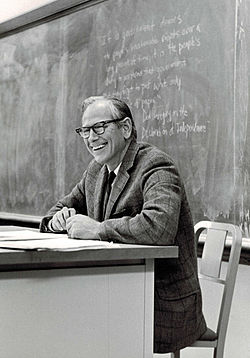Robert A. Dahl Quote
I’m going to invite you to contemplate a fictional scenario. Say that we are all citizens in a New England town with a traditional town meeting. As usual, a modest proportion of the citizens eligible to attend have actually turned out, let’s say four or five hundred. After calling the meeting to order, the moderator announces: We have established the following rules for this evening’s discussion. After a motion has been properly made and seconded, in order to ensure free speech under rules fair to everyone here, each of you who wishes to do so will be allowed to speak on the motion. However, to enable as many as possible to speak, no one will be allowed to speak for more than two minutes. Perfectly fair so far, you might say. But now our moderator goes on: After everyone who wishes to speak for two minutes has had the floor, each and every one of you is free to speak further, but under one condition. Each additional minute will be auctioned off to the highest bidder. The ensuing uproar from the assembled citizens would probably drive the moderator and the board of selectman away from the town hall—and perhaps out of town. Yet isn’t this in effect what the Supreme Court decided in the famous case of Buckley v. Valeo? In a seven-to-one vote, the court held that the First Amendment–guarantee of freedom of expression was impermissibly infringed by the limits placed by the Federal Election Campaign Act on the amounts that candidates for federal office or their supporters might spend to promote their election.3 Well, we’ve had time to see the appalling consequences.
I’m going to invite you to contemplate a fictional scenario. Say that we are all citizens in a New England town with a traditional town meeting. As usual, a modest proportion of the citizens eligible to attend have actually turned out, let’s say four or five hundred. After calling the meeting to order, the moderator announces: We have established the following rules for this evening’s discussion. After a motion has been properly made and seconded, in order to ensure free speech under rules fair to everyone here, each of you who wishes to do so will be allowed to speak on the motion. However, to enable as many as possible to speak, no one will be allowed to speak for more than two minutes. Perfectly fair so far, you might say. But now our moderator goes on: After everyone who wishes to speak for two minutes has had the floor, each and every one of you is free to speak further, but under one condition. Each additional minute will be auctioned off to the highest bidder. The ensuing uproar from the assembled citizens would probably drive the moderator and the board of selectman away from the town hall—and perhaps out of town. Yet isn’t this in effect what the Supreme Court decided in the famous case of Buckley v. Valeo? In a seven-to-one vote, the court held that the First Amendment–guarantee of freedom of expression was impermissibly infringed by the limits placed by the Federal Election Campaign Act on the amounts that candidates for federal office or their supporters might spend to promote their election.3 Well, we’ve had time to see the appalling consequences.
Related Quotes
About Robert A. Dahl
He established the pluralist theory of democracy—in which political outcomes are enacted through competitive, if unequal, interest groups—and introduced "polyarchy" as a descriptor of actual democratic governance. An originator of "empirical theory" and known for advancing behavioralist characterizations of political power, Dahl's research focused on the nature of decision making in actual institutions, such as American cities. He is the most important scholar associated with the pluralist approach to describing and understanding both city and national power structures.
In addition to his work on the descriptive theory of democracy, he was long occupied with the formulation of the constituent elements of democracy considered as a theoretical but realizable ideal. By virtue of the cogency, clarity, and veracity of his portrayal of some of the key characteristics of realizable-ideal democracy, as well as his descriptive analysis of the dynamics of modern pluralist-democracy, he is considered one of the greatest theorists of democracy in history.
